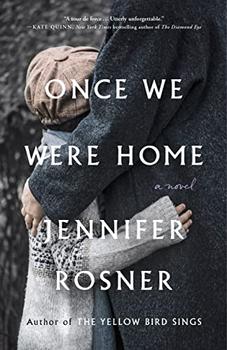Summary | Excerpt | Reading Guide | Reviews | Beyond the book | Read-Alikes | Genres & Themes | Author Bio

"One of the most harrowing, powerful, and imaginative books of the year" (Anthony Doerr) about twin sisters fighting to survive the evils of World War II.
Pearl is in charge of: the sad, the good, the past.
Stasha must care for: the funny, the future, the bad.
It's 1944 when the twin sisters arrive at Auschwitz with their mother and grandfather. In their benighted new world, Pearl and Stasha Zagorski take refuge in their identical natures, comforting themselves with the private language and shared games of their childhood.
As part of the experimental population of twins known as Mengele's Zoo, the girls experience privileges and horrors unknown to others, and they find themselves changed, stripped of the personalities they once shared, their identities altered by the burdens of guilt and pain.
That winter, at a concert orchestrated by Mengele, Pearl disappears. Stasha grieves for her twin, but clings to the possibility that Pearl remains alive. When the camp is liberated by the Red Army, she and her companion Feliks--a boy bent on vengeance for his own lost twin--travel through Poland's devastation. Undeterred by injury, starvation, or the chaos around them, motivated by equal parts danger and hope, they encounter hostile villagers, Jewish resistance fighters, and fellow refugees, their quest enabled by the notion that Mengele may be captured and brought to justice within the ruins of the Warsaw Zoo. As the young survivors discover what has become of the world, they must try to imagine a future within it.
A superbly crafted story, told in a voice as exquisite as it is boundlessly original, Mischling defies every expectation, traversing one of the darkest moments in human history to show us the way toward ethereal beauty, moral reckoning, and soaring hope.
It is hard to describe the alchemy that Konar performs to make this story so uplifting. In a way, she has created a kinder, gentler twin experiment of her own: how will Sasha and Pearl, "two parts," so alike, but so different in disposition, face and overcome their traumas, with rage or with kindness, vengeance, or forgiveness. The results of this experiment, unlike those conducted at Auschwitz, actually has value for humanity...continued
Full Review
(711 words)
This review is available to non-members for a limited time. For full access,
become a member today.
(Reviewed by Lisa Butts).
 The twins in Mischling are loosely based on Romanian sisters Eva and Miriam Mozes, survivors of "Angel of Death" Josef Mengele's sadistic experiments at Auschwitz. Having studied twins in a legitimate capacity earlier in his career, Mengele took advantage of his position as a doctor at Auschwitz to perform unwarranted operations, mutilations, deadly blood transfusions, and other atrocities on the hundreds of sets of twins forced into the labor camp. Mengele reportedly injected his subjects' eyes with chemicals in an attempt to change their color (Stasha suffers this treatment in Mischling) and if one twin died the other was swiftly murdered so Mengele could perform a comparative post-mortem (or, as likely in many cases, because a single...
The twins in Mischling are loosely based on Romanian sisters Eva and Miriam Mozes, survivors of "Angel of Death" Josef Mengele's sadistic experiments at Auschwitz. Having studied twins in a legitimate capacity earlier in his career, Mengele took advantage of his position as a doctor at Auschwitz to perform unwarranted operations, mutilations, deadly blood transfusions, and other atrocities on the hundreds of sets of twins forced into the labor camp. Mengele reportedly injected his subjects' eyes with chemicals in an attempt to change their color (Stasha suffers this treatment in Mischling) and if one twin died the other was swiftly murdered so Mengele could perform a comparative post-mortem (or, as likely in many cases, because a single...
This "beyond the book" feature is available to non-members for a limited time. Join today for full access.

If you liked Mischling, try these:

by Jennifer Rosner
Published 2024
From Jennifer Rosner, National Jewish Book Award Finalist and author of The Yellow Bird Sings, comes a novel based on the true stories of children stolen in the wake of World War II.

Djinn Patrol on the Purple Line
by Deepa Anappara
Published 2021
In this transporting debut novel, three friends venture into the most dangerous corners of a sprawling Indian city to find their missing classmate.
If there is anything more dangerous to the life of the mind than having no independent commitment to ideas...
Click Here to find out who said this, as well as discovering other famous literary quotes!